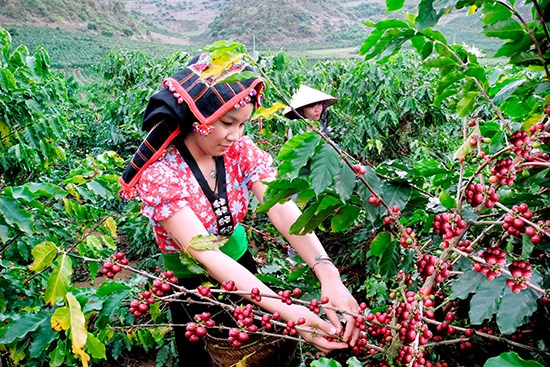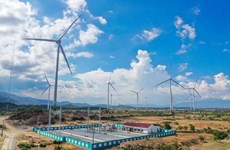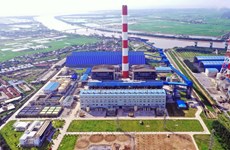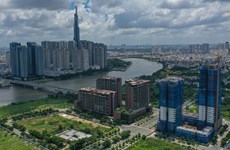Son La coffee growers supported in sustainable development
More than 4,300 coffee growing households in the northern province of Son La will receive support in coffee farming, production and trade under a 2-year project by the Foundation for International Development/Relief (FIDR) Vietnam Office – a Japan-based international non-Governmental organisation.
 Harvesting coffee in Chieng Ban commune, Mai Son district, Son La province. (Photo baosonla.org.vn)
Harvesting coffee in Chieng Ban commune, Mai Son district, Son La province. (Photo baosonla.org.vn)The “Sustainable Coffee Project” launched last week via a webinar will be implemented in six communes belonging to Thuan Chau district, Mai Son district and Son La city.
Nobuko Otsuki, FIDR Vietnam Office’s Country Representative, said that with sponsorship from AEON, the FIDR in cooperation with Tay Bac University, Son La province authorities and several supply chain companies would work together for sustainable coffee production through community development.
Under the project, local coffee growers will have the chance to join training courses to improve their literacy, negotiation skills, farming techniques and trade-related skills, she said.
Kahori Miyake, representative from AEON, said that the project was prepared for more than one year but due to the COVID-19 pandemic, the project's activities were changed to adapt to the new situation.
However, the participation of parties including the Tay Bac University, FIDR, Son La authorities and coffee farmers made the project run effectively.
“People are happy to enjoy a delicious cup of coffee. When having the coffee, we should thank those who grow it, process it and sell it,” she said, adding that the AEON group expected that their consumers, especially those in Japan, to know about Son La coffee and coffee growers.
Dinh Thanh Tam, Rector of the Tay Bac University, said that Son La province was the home of delicious fruit and farming produce thanks to a good climate and geographical conditions.
Coffee has been grown in Son La province since the 1980s. The province currently has nearly 18,000 hectares of coffee, with last year’s production at more than 25,000 tonnes.
Coffee is grown mostly in the districts of Mai Son, Thuan Chau, Sop Cop, Yen Chau and Son La city.
“Catimor coffee grown in Son La province has good quality and it’s a pride of the locality,” Tam said, adding that coffee farming helped local people improve incomes and living standards in the last few years.
However, coffee growers in Son La province faced disadvantages relating to limited farming level and trade understanding.
Farmers mostly sold raw coffee at low prices, Tam said, adding that technical and trade support was much needed.
Ca Thi Bien, a farmer in Chieng Ban commune, Mai Son district, said that she was happy to see that people liked the coffee made in Son La.
She said she expected to learn more about farming and trading thanks to the project’s support so that she could have a better stable income, thus could pay her debts, send her children to school and open a grocery store.
Cam Thi Phong, vice director of the province’s Agriculture and Rural Development Department, said that in the last few years despite improved facilities for coffee production, Son La coffee still faced difficulties.
Old coffee trees with low yield were common in a large area. Coffee farmers have yet to apply measures to ensure sustainable development or become resilient to climate change, Phong said.
Nguyen Xuan Hoang, Vice Chairman of the People’s Committee of Thuan Chau district, said that most of the 5,500 hectares of coffee in the district were in hilly land, causing difficulties for farmers in harvesting and transporting.
Farmers used motorbikes to carry coffee from farms to purchasing sites of wholesalers, so labour costs are very high. Most of the farmers used home-made fertilisers and conventional farming techniques without proper understanding, Hoang said.
“Notably, farmers sold coffee to wholesalers and hardly knew where the coffee would go next, or for which companies. As a result, Son La coffee has not developed its own brand despite its good quality,” Hoang said, urging further support in brand development.
Bui Thi Dinh, deputy chief of Mai Son District’s Agriculture Division, said local farmers had difficulties in processing their coffee and treating agricultural waste.
A kilo of fresh coffee can be sold at 8,000-8,500 VND, but a kilo of dried coffee sold at 12,00-14,000 VND. Despite the big difference, local farmers mostly sold unprocessed coffee, she said.
The project is expected to offer solutions to lower input costs as well as proper market understanding so that farmers can get better coffee prices./.











